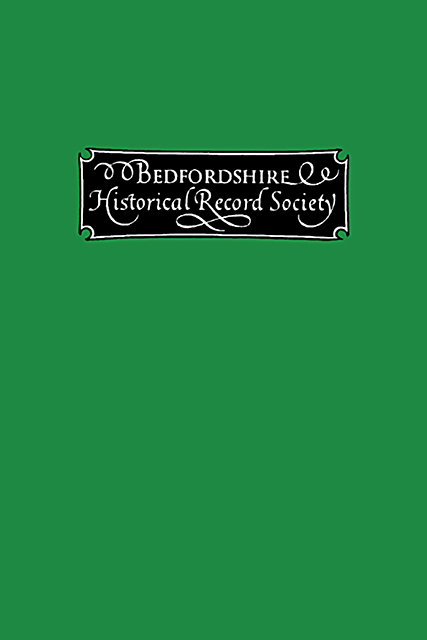Book contents
- Frontmatter
- Contents
- Abbreviations and Symbols
- A Bedford Fragment and the Burning of two Fraticelli at Avignon in 1354
- John Lord Wenlock of Someries
- The Tower of London Letter-Book of Sir Lewis Dyve, 1646-47
- Inventory of Furniture at Houghton House, c. 1726-28
- Index of Persons and Places
- Index of Subjects
- Miscellaneous Endmatter
John Lord Wenlock of Someries
Published online by Cambridge University Press: 14 July 2023
- Frontmatter
- Contents
- Abbreviations and Symbols
- A Bedford Fragment and the Burning of two Fraticelli at Avignon in 1354
- John Lord Wenlock of Someries
- The Tower of London Letter-Book of Sir Lewis Dyve, 1646-47
- Inventory of Furniture at Houghton House, c. 1726-28
- Index of Persons and Places
- Index of Subjects
- Miscellaneous Endmatter
Summary
The story of the life of John Wenlock of Someries is likely to be of some interest to Bedfordshire historians. His family, while retaining property in their native Shropshire, had settled in Bedfordshire in the fourteenth century. John’s father and another member of the family, perhaps an elder brother, had now and then represented the county in Lancastrian parliaments. So did John himself, six times in all : in 1433, 1437, 1439-40, 1447, 1449 and 1455-6. On the last of these occasions he acted as Speaker for the Commons.
Wenlock’s election as Speaker, in the parliament which met soon after the Yorkist victory in the first battle of St. Albans, was the culmination of his career as an occasional member of the Lower House. It was not the acme of his career more widely regarded. Even so, by 1455 he had come far. In the 1430s closely connected with a Bedfordshire magnate, Lord Fanhope of Ampthill (a great-uncle of Henry VI by marriage), it was in the 1440s that Wenlock moved quickly forward, first, as an usher of the King’s Chamber, and then, after diplomatic services in the cause of an Anglo-French peace and the King’s marriage with Margaret of Anjou, as an usher of the Queen’s Chamber and, later (by quick promotion), as her Chamberlain. Perhaps partly as a result of being a victim of Henry VI’s chronic financial insolvency, by 1459 Wenlock had cut adrift from intimate association with the Lancastrian Court and thrown in his lot with the Yorkists.
Wenlock took a very active part in those movements of Yorkist rebellion whose final outcome was the displacement of Henry VI and the accession of Edward IV in 1461. His help to the Yorkist cause had been worth having, and clearly still was. And Wenlock got his price : immediately, Edward IV made him a member of his Council, raised him to the peerage, and appointed him as Chief Butler of England, Chamberlain of the Duchy of Lancaster, and Treasurer of Ireland. Much reliance was also put on his obvious flair for diplomacy with the French, and in the last ten years of his life never a year went by but Wenlock crossed the Channel as a member of some embassy.
- Type
- Chapter
- Information
- Publisher: Boydell & BrewerFirst published in: 2023



